Ford Puma VS Lexus RC – Specs, Efficiency & Price Comparison
Which model is the better choice – the Ford Puma or the Lexus RC? We compare performance (168 HP vs 464 HP), boot capacity (523 L vs 366 L), efficiency (13.10 kWh5.40 L vs 11.80 L), and of course, the price (24800 £ vs 82300 £).
Find out now which car fits your needs better!
The Ford Puma (SUV) is powered by a Petrol MHEV or Electric engine and comes with a Manuel or Automatic transmission. In comparison, the Lexus RC (Coupe) features a Petrol engine and a Automatic gearbox.
When it comes to boot capacity, the Ford Puma offers 523 L, while the Lexus RC provides 366 L – depending on what matters most to you. If you’re looking for more power, you’ll need to decide whether the 168 HP of the Ford Puma or the 464 HP of the Lexus RC suits your needs better.
There are also differences in efficiency: 13.10 kWh5.40 L vs 11.80 L. In terms of price, the Ford Puma starts at 24800 £, while the Lexus RC is available from 82300 £.
Compare all the key specs now and find out which model fits your lifestyle best!
Ford Puma
The Ford Puma presents itself as a stylish compact SUV with a distinctive design that combines practicality with a dynamic driving experience. Its sleek lines and sporty aesthetics make it stand out on the road, while the interior offers a comfortable and tech-savvy environment. With an emphasis on efficiency and a smooth drive, the Ford Puma is well-suited for both urban commutes and countryside adventures.
details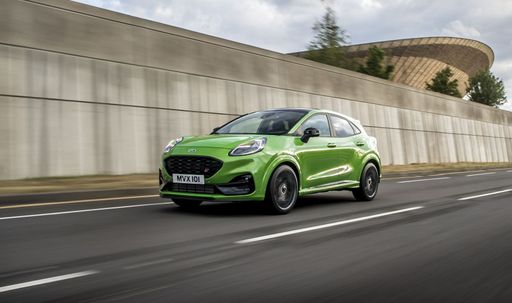 @ puma.fordpresskits.com
@ puma.fordpresskits.com
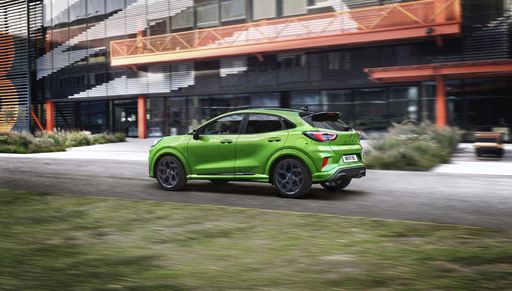 @ puma.fordpresskits.com
@ puma.fordpresskits.com
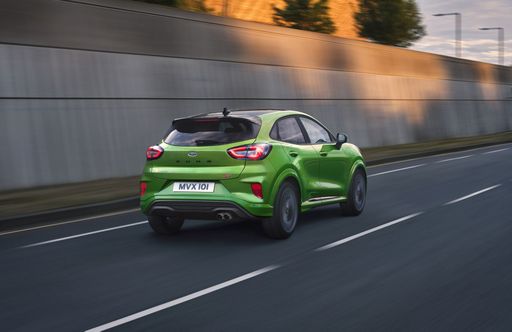 @ puma.fordpresskits.com
@ puma.fordpresskits.com
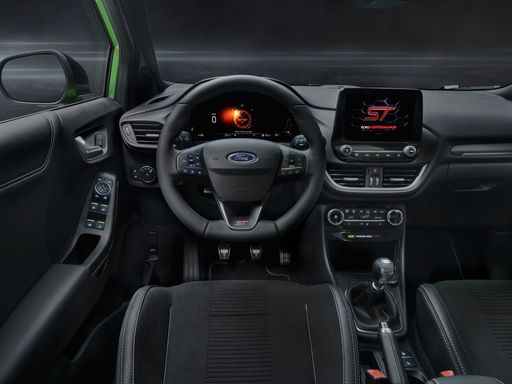 @ puma.fordpresskits.com
@ puma.fordpresskits.com
Lexus RC
The Lexus RC is a striking blend of luxury and performance, embodying a sleek, aerodynamic design that captures attention on any road. Its interior boasts high-quality materials and meticulous craftsmanship, providing a comfortable and refined driving experience. Coupled with responsive handling and a dynamic driving feel, this vehicle appeals to those who seek both style and substance in their automotive choice.
details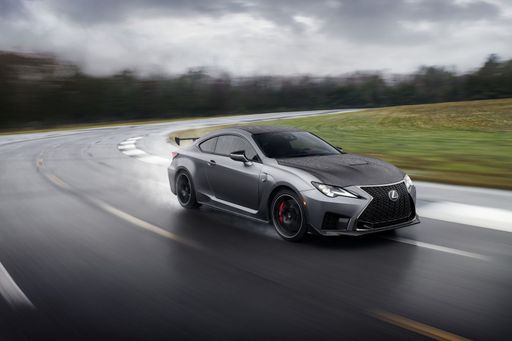 @ toyota-media.de
@ toyota-media.de
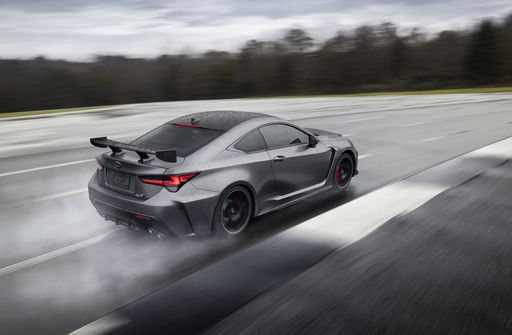 @ toyota-media.de
@ toyota-media.de
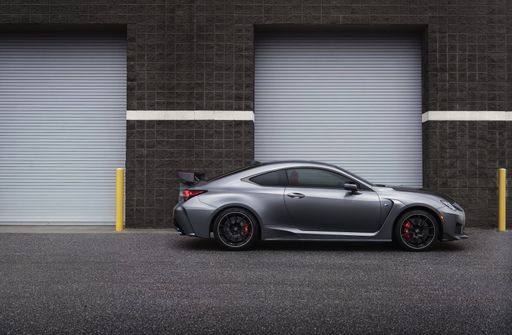 @ toyota-media.de
@ toyota-media.de
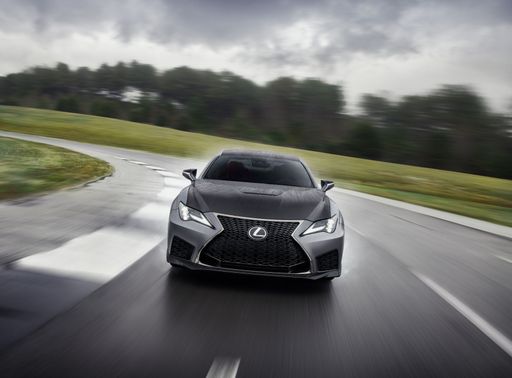 @ toyota-media.de
@ toyota-media.de
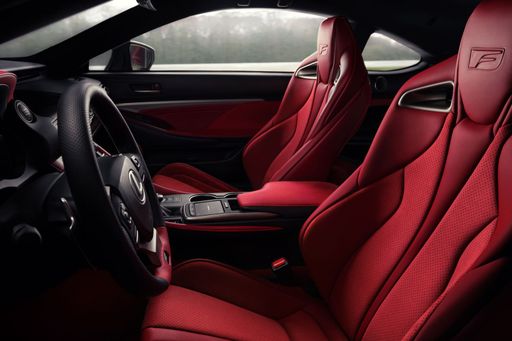 @ toyota-media.de
@ toyota-media.de

|

|
|
|
|
Costs and Consumption |
|
|---|---|
|
Price
24800 - 36300 £
|
Price
82300 - 101500 £
|
|
Consumption L/100km
5.4 - 6 L
|
Consumption L/100km
11.80 L
|
|
Consumption kWh/100km
13.1 - 13.7 kWh
|
Consumption kWh/100km
-
|
|
Electric Range
364 - 376 km
|
Electric Range
-
|
|
Battery Capacity
43 kWh
|
Battery Capacity
-
|
|
co2
0 - 136 g/km
|
co2
268 g/km
|
|
Fuel tank capacity
42 L
|
Fuel tank capacity
66 L
|
Dimensions and Body |
|
|---|---|
|
Body Type
SUV
|
Body Type
Coupe
|
|
Seats
5
|
Seats
4
|
|
Doors
5
|
Doors
3
|
|
Curb weight
1316 - 1563 kg
|
Curb weight
1715 kg
|
|
Trunk capacity
456 - 523 L
|
Trunk capacity
366 L
|
|
Length
4186 - 4226 mm
|
Length
4710 mm
|
|
Width
1805 mm
|
Width
1845 mm
|
|
Height
1550 - 1555 mm
|
Height
1390 mm
|
|
Payload
367 - 469 kg
|
Payload
535 kg
|
Engine and Performance |
|
|---|---|
|
Engine Type
Petrol MHEV, Electric
|
Engine Type
Petrol
|
|
Transmission
Manuel, Automatic
|
Transmission
Automatic
|
|
Transmission Detail
Schaltgetriebe, Automat. Schaltgetriebe (Doppelkupplung)
|
Transmission Detail
Automatikgetriebe
|
|
Drive Type
Front-Wheel Drive
|
Drive Type
Rear-Wheel Drive
|
|
Power HP
125 - 168 HP
|
Power HP
464 HP
|
|
Acceleration 0-100km/h
7.4 - 9.8 s
|
Acceleration 0-100km/h
4.3 - 4.5 s
|
|
Max Speed
160 - 210 km/h
|
Max Speed
270 km/h
|
|
Torque
170 - 290 Nm
|
Torque
520 Nm
|
|
Number of Cylinders
3
|
Number of Cylinders
8
|
|
Power kW
92 - 124 kW
|
Power kW
341 kW
|
|
Engine capacity
999 cm3
|
Engine capacity
4969 cm3
|
General |
|
|---|---|
|
Model Year
2024 - 2025
|
Model Year
2021 - 2024
|
|
CO2 Efficiency Class
D, E, A
|
CO2 Efficiency Class
G
|
|
Brand
Ford
|
Brand
Lexus
|
Ford Puma
A Glimpse into the Ford Puma: Fusing Style with Innovation
The Ford Puma stands as a testament to modern engineering fused with style. This compact SUV is not just about aesthetics but brings to the table an array of technical innovations, topped with the reliability and performance Ford is known for. Let's delve into the technical specifics and innovative features that make the Ford Puma a stellar choice for any car enthusiast.
Powertrains and Performance
The Ford Puma is offered with a range of powertrains designed to deliver optimal performance whilst minimising fuel consumption. At the heart of this compact SUV is the 1.0 EcoBoost Hybrid engine, available in both 125 PS and 155 PS variants. This engine is a marvel of engineering, optimised to deliver power efficiently with a remarkable fuel consumption ranging from 5.4 to 5.7 L/100km for manual versions, and slightly higher for the automated variants.
The top-end 1.5 EcoBoost ST variant takes performance up a notch, providing a robust 200 PS that propels the Puma from 0 to 100 km/h in just 6.7 seconds. This variant is perfect for those who prioritise performance and exhilaration in their driving experience.
Mild-Hybrid Technology
The Puma's mild-hybrid technology plays a significant role in enhancing fuel efficiency and reducing emissions. By utilising a belt-driven integrated starter/generator, the Puma recovers energy usually lost during braking, storing it in a 48-volt lithium-ion battery. This stored energy is then used to assist the engine, providing a boost during acceleration and smoothing out the stop-start technology, ultimately leading to enhanced fuel efficiency.
Design and Comfort
The Ford Puma does not compromise on style and comfort with its ergonomic and stylish design. The SUV is available in multiple trims including the ST-Line, Titanium, and the luxurious Vignale editions, each offering unique aesthetic and technological enhancements. These trim levels provide varied offerings in terms of both exterior styling and interior comfort, ensuring there's a Puma that meets every personal preference.
Inside, the Puma offers a driver-focused cockpit with advanced technological integrations such as the SYNC 3 infotainment system, providing seamless connectivity and intuitive control of the vehicle's numerous technological features.
Safety and Technology
Safety remains paramount, and the Ford Puma is equipped with the latest security and technology features. It boasts the Ford Co-Pilot360 suite which includes adaptive cruise control, pre-collision assist with autonomous emergency braking, and lane-keeping assist, enabling a safer driving experience on both city roads and highways.
Versatility and Practicality
Beyond performance and safety, the Ford Puma shines in its versatility. With a boot capacity of 456 litres, it offers ample space for all sorts of adventures, whether you're heading on a family trip or loading sports equipment. Its innovative MegaBox is an extra storage solution, providing additional space below the boot floor.
The Puma's agile handling, paired with its compact dimensions—spanning a length of 4186 to 4266 mm and a width of 1805 mm—makes it an ideal choice for urban commuting and beyond.
Conclusion
In conclusion, the Ford Puma beautifully blends practical features with cutting-edge technology, offering a package that appeals to both the tech-savvy driver and those seeking comfort and reliability. Its range of innovative features, powerful yet efficient engine options, and a design that is both functional and stylish make it a frontrunner in the compact SUV market.
Whether you're drawn by the efficient mild-hybrid engines or the robust performance of the ST variant, the Ford Puma represents a modern driving experience where innovation meets everyday usability.
Lexus RC
Introducing the Lexus RC: A Fusion of Elegance and Performance
The Lexus RC stands as a testament to the brand’s relentless pursuit of perfection. This coupe, with its striking design and breathtaking performance, amalgamates cutting-edge technology with luxury, setting a high bar for not just itself but for the entire segment. Let's dive into the technical marvels and innovative features that the Lexus RC has to offer.
Power Under the Hood: Unleashing the V8 Beast
At the heart of the Lexus RC is a formidable 5.0-litre V8 engine, effortlessly producing 464 PS (341 kW) and a torque of 520 Nm. This beast of an engine ensures that the RC is not just a pretty face but a veritable powerhouse, capable of accelerating from 0 to 100 km/h in a mere 4.3 to 4.5 seconds. With a top speed of 270 km/h, this coupe guarantees an exhilarating driving experience.
Transmission and Drivetrain: Precision in Motion
The RC is equipped with a seamless automatic transmission that smoothly harnesses the engine’s raw power, delivering it to the rear wheels thanks to its refined rear-wheel-drive system. This configuration not only enhances driving dynamics but also provides a more engaging and thrilling ride, making each journey unforgettable.
Design and Dimensions: Sleek, Sporty and Spacious
Measuring 4710 mm in length, 1845 mm in width, and 1390 mm in height, the Lexus RC strikes a perfect balance between a compact coupe and spacious luxury car. Its sleek design is complemented by functional dimensions, housing a boot capacity of 366 litres. The elegant exterior is matched by a luxurious interior, crafted to enhance the driver’s connection to the road.
Efficiency and Environmental Considerations
While performance is a priority, the Lexus RC also considers efficiency, featuring an 11.8 L/100km fuel consumption rate. However, it's noteworthy that the RC falls into the CO2 efficiency class G, with emissions rated at 268 g/km. This performance powerhouse thus reflects a blend of thrilling dynamics and conscious engineering.
Comfort and Technological Innovations: Beyond the Drive
Inside, the RC doesn't shy away from technology. High-end materials and cutting-edge tech simplify and enhance the driving experience. Its intuitive infotainment system and superior sound quality affirm Lexus’s commitment to luxury and innovation, turning the cabin into an oasis of comfort amidst the roaring engine's excitement.
Conclusion: A Spectacle of Luxury and Performance
The Lexus RC is not just an automobile; it's a statement. With its combination of bold aesthetics, remarkable power, and luxurious craftsmanship, it stands as an impressive vehicle that appeals to those who have a zest for life and a love for driving. True luxury is not just about opulence but also about merging power with precision, a feat the Lexus RC accomplishes with aplomb.
The prices and data displayed are estimates based on German list prices and may vary by country. This information is not legally binding.
